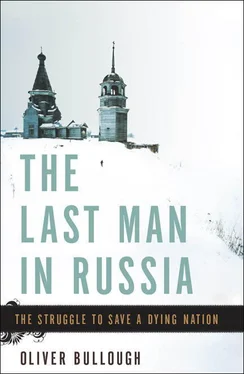‘Do you remember me?’ he had asked. Kovalyov said he did not.
‘That cannot be. I abused you in Perm-35 and 36, how can you not remember your major oppressor? I worked here for days on end, everything came through me. So why don’t they remember the main monster?’ he replied. He may have been trying to be sarcastic, but was clearly offended by how history had flipped round. He had been in a position of power, and was now one of life’s losers, while Kovalyov is fêted around the world.
He insisted that conditions in the camp had actually been very pleasant, that the dissidents ate better than most people in the country and had had nothing to complain about.
‘They were in the warm and dry, they ate at a table with a tablecloth, having previously looked at a menu. Apart from that their books were published abroad. When they needed new glasses, they declared a hunger strike or refused to work. Therefore, people did not die in our camp, like they did in Kolyma,’ he said.
It was a telling comment, with its total incomprehension of the motivation of people he had seen every day for years. He seemed unable to understand that it was the fact of being locked up that was the problem, not the conditions. If you have been imprisoned for writing a poem, no amount of tablecloths is going to make you happy about it. The difference between this Kurguzov and the likes of Kovalyov is – ironically, considering the positions they used to occupy – that between a slave and a free man.
Kurguzov, like the young men sent to disrupt the Pilorama discussions, insisted that the festival was funded from abroad (it is, in fact, mostly supported by the local government) to harm the image of Russia. That is an argument that only works if you look the wrong way down the telescope. If you turn it round you see, not the shameful fact of the camp, but the heroic resistance of the inmates. The attendees of the festival preferred to focus on the trust and respect among the former prisoners, rather than the whining of their former guards.
The festival had erected a stage in the centre of the camp, and the performers could look down the length of the barracks to the front gate. I had wondered who would play for the finale, expecting an earnest bard with a guitar and a songbook of protests. Fortunately, the organizers knew their audience better than that, and out came Markscheider Kunst, a Russian ska band with a horn section exuberant even by the magnificent standards of the St Petersburg music scene.
Their two drummers whipped out their irresistible rhythm, while the saxophone and trumpet sent a torrent of glorious brass through the old cells, between the bars, over the fences and into the forest beyond. No evil spirit of the past could withstand such joyful playfulness, and the crowd whooped along. A young woman at the front jumped up and down, her long glossy dark hair whipping back and forth in time with the music.
They are not a political band, but it was hard not to notice the lyrics to their anthemic ‘Krasivo Sleva’. ‘Winter is ending, we’ll start again from the beginning, winter is ending, winter is ending,’ they sang, and once again the horns blasted out their glorious crescendo.
The night before, my tent had been one of hundreds by the river in a field noisy with music, laughter and singing. Beneath all those sounds though, from the other tents, from all directions, had come the muffled but unmistakable sounds of young Russians getting busy making a new generation.
It was 28 June, the anniversary of Father Dmitry’s death, and I went looking for his grave in Moscow’s Friday Cemetery.
I cut left and right, trending downhill along paths pushed through the mass of granite. Graves were piled together in vast numbers. It looked impossible that there could be room for as many people below the ground as were commemorated above it. Fifty-year-old graves were wedged up against ones from last week.
Close to the ragged wall that separated the cemetery from, by the sound of it, a major highway, a crowd of fifty or so people were already gathered. A young woman, seeing my camera, showed me through and pointed out Dudko’s grave – 24 February 1922 to 28 June 2004. His life had coincided, more or less, with that of the Soviet Union.
Here was a mixed crowd: women in headscarves, young and old; men in open-necked shirts, some bearded, most not. There was Father Mikhail Dudko, Father Alexander and Father Vladimir, all in the sweeping robes of their office. They donned pectoral crosses. Father Mikhail slipped a golden cloth around his neck, and the service began.
The light-blue fences placed around many of the graves interrupted the unity of the congregation, which was forced to cram itself in where it could. But the Orthodox chant was glorious for all that. Father Mikhail’s cracked voice led the chant in a strained falsetto; then the lovely many-level response mingled itself with the wind in the trees.
The Old Slavonic chanting had its usual lulling effect. The antiquated language made it easy to concentrate on the purity of the sound, not the meaning of the sentences, rather like going to see the opera in a language you do not speak. Father Alexander took over after a while, his nostrils were flared slightly and his bushy beard did not obscure the pure good looks that Russian soldiers have in World War Two newsreels.
‘Dear fathers, brothers and sisters. Today, we honour the memory of Father Dmitry. Today, we have made a pilgrimage to this holy place where Father Dmitry, his body is buried. His soul is always with us, because he did a lot for us, he strengthened us, he united us. Is this not true? In the hardest conditions of persecution, he supported us. And thanks be to God that we are once more together,’ the priest said, warming to his theme. ‘He was a true father, he worried about his children. That’s how he was, and this affected us also. He gathered us in, and treated our spiritual diseases. He had a particular faith, a particular spirit. We honour him with kind memories, bright memories, we pray for him.’
A mutter of prayer passed through the worshippers, whose attention was completely fixed on the priest. He passed the gold cloth to Father Vladimir, and the chant renewed itself. White incense smoke swirled among the gravestones. The crowd begged with their sweet voices for forgiveness from God in the manner that Russians have prayed for centuries, ever since the first king in long-ago Kiev adopted the faith of the Greeks.
The wind sighed in the trees, and the sunlight danced on the gravestones. The horrible heat of the day did not penetrate down here. The chanting lulled me again as it faded in and out. Today’s Moscow might be a bustling city of banks and billboards and Bentley showrooms, but this felt like the Russia that had endured for centuries before banks were even thought of.
When the ceremony was over, a small group of women came over to quiz me gently on who I was and what I was doing. I explained my interest in Father Dmitry, and my concern over the falling population, and they began to tell me about how they had met him and what he meant for them and how much he had cared about the dying Russian nation.
‘When I first went to his house, I was amazed, just by what it looked like at first. There was this terrible mess, but that was just on the surface. His whole family, well, they paid no attention to these domestic things. I completely did not understand. If you had something, you had it; if not, not; for me it was really strange. They lived in a sort of non-material way. That was the first thing,’ one woman called Ksenia told me.
A second woman chipped in: ‘When you entered their family, you entered a different world.’
Ksenia again: ‘That’s where it all started.’
Читать дальше












